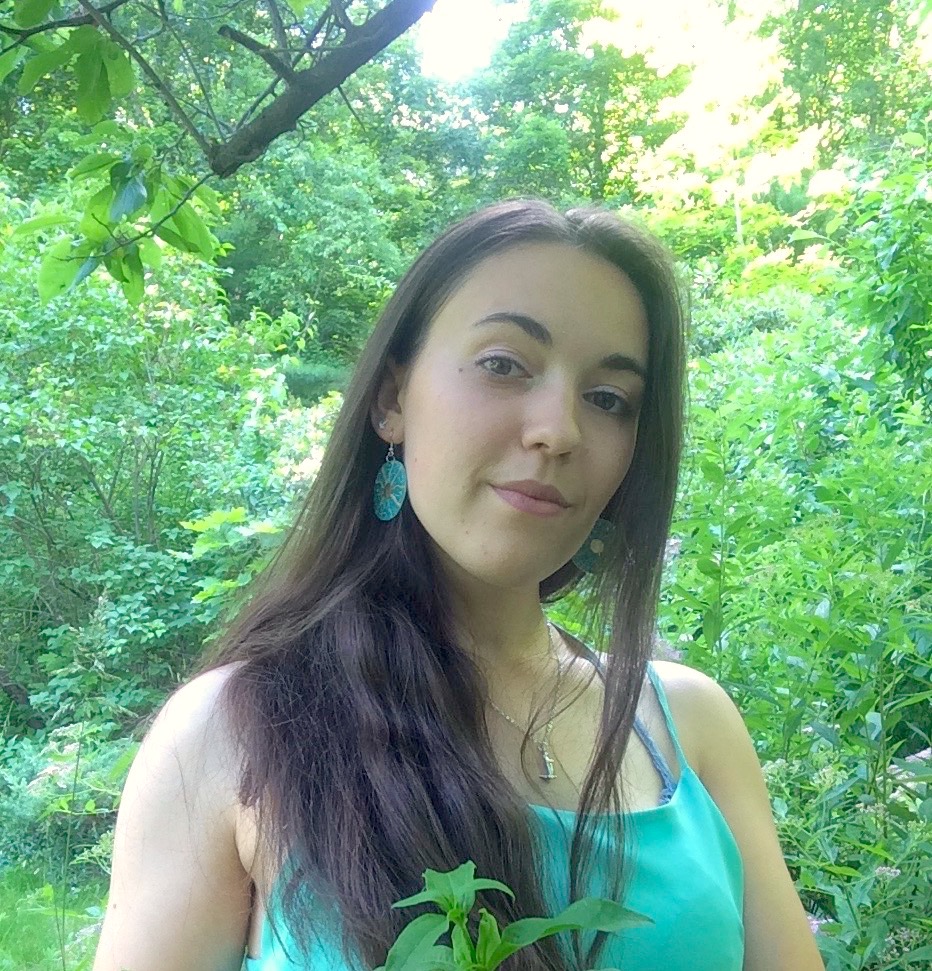At the End of Purple Meadow Road
by Marisca Pichette
Edited by Hal Y. Zhang
Copyedited by Chelle Parker
April 2022
952 words — Reading time: around 4 minutes
There is an arbor of wisteria. I tend it in the summer and sit underneath its naked branches in the fall. Lichen decorates the bench to the left, moss the bricks to the right.
My bare feet leave depressions in the moss.
The paths have no neat ends, winding between juniper and yew, under arching rhododendron and hunched lace maple, around obsidian cairns and quartz birdbaths. I laid the paths myself, selecting seaglass, bone, and fossilized wood to form their mosaic. Shells — snail, ammonite, cicada — articulate their edges. When I walk along them, I walk parallel, my feet on moss and soil and grass. To disturb the paths would be to ruin the remains of the creatures I once cherished.
(I still cherish them, you know. You know when you see me walking beside their exquisite corpses, stopping to study contours, iridescence. You know when I hike up my skirt and kneel in the topsoil, my apron full of remnants.)
Some paths lead to trees and treehouses. Some lead to a meadow of lavender. This, of course, is my road’s namesake. In between lavender stalks, milkweed releases its intoxicating perfume. In April, monarch butterflies turn the air ochre and black.
(I’m easily spotted from the road. You don’t have to cross the field to see me, arms outstretched, pockets distended with dead things. I am usually humming, or laughing at the season.)
The colors I wear trail from my hair and my wrists. My apron strings are decorated with ribbons and wire. My ankles jingle with exoskeletons. I hang butterfly wings from my ears until the sun turns them to dust.
(You may be thinking at this point that there is nothing here besides my garden. There you would be both right and wrong.)
A bed of ajuga and violets surrounds my house on the edge of Purple Meadow Road. Its walls are green with algae. I have planted myrtle on the roof, and lilac by the door.
Inside, my house is just one room. You may be surprised to see that I grow no plants here. My shelves are covered instead with stones: pumice, flint, chalk. Fragments of the earth, unearthed in my garden. I touch them every morning, and in the evening.
From my windows, I can see:
The forested hills in the east.
My garden in the west.
My garden in the south.
Purple Meadow Road in the north.
(I know you are wondering. My garden is large. It hugs my house. My house is small. Its windows are narrow. The road is distant, but visible each time someone drives by, dust and rumbling distorting the air, lavender and milkweed swaying as butterflies take flight.)
I am not isolated, here at the end of the road, at the end of the meadow. I write letters to my living friends. There is Zylpha, whose house rests on the edge of a field of mountain laurel. Eudora writes to me from a cottage surrounded by fiddleheads. Vertiline cultivates a garden of nightshade. Permilia corresponds often, from the shade of a willow grove. And Orpha, her windows crowded with cattails.
Mountain Laurel Path, Fern End, Nightshade Circle, Willow Drive, Cattail Avenue. Their letters come to me and collect on my windowsill, sealed with wax and sap. Sometimes letters become lost.
(Is that what brought you here, to the end of Purple Meadow Road?)
I read their letters on my bench, in my garden, sitting in the middle of lavender and milkweed and butterflies. We all write about our roads, gardens, meadows, and swamps. We all write about seasons that try us. We all write about mornings that shimmer. We all write about our happiness, our sorrow.
We all write.
To each other, to ourselves. (To you.)
I have never read a word that wasn’t written by hand, from a woman I know deeper than myself.
When all my letters are sent and my thoughts continue to flow, I write to my garden. I write to the bodies that form its paths, the bodies that root in its soil, the bodies outside of my own. And yet, always, they find their way to connect with mine.
In touching, I am touched. In seeing, I am seen. In writing, I am written.
(Was it a ribbon that brought you, color on the breeze? There are words there, too, if you can read them.)
At the end of Purple Meadow Road, I have lived as long as the butterflies and longer than the lavender. My end is much the same as Zylpha’s, and Veritline’s. Quiet, and not. Still, and very much alive. Our homes are often overlooked.
(The road is within sight. Butterflies adorn the air like autumn leaves given fresh life.)
One thing: I have the power to keep nothing living. Everything that grows must remain outside of my house. It must be clear, then, that I do not grow, as I pass between the lilacs that guard the door. All I carry is static, fragmented. As a guardian of life, I am permitted only to hold broken things.
(And you, standing before me, fractured. Are you a broken thing, looking for gold to fill your cracks?)
We all write about this, too. Exiled at our ends, listening without being heard. Holding without being held. Letters connect us like webs.
Paper is a broken tree, ink a broken petal.
Oh, Eudora, Orpha, Permilia. I write to you. To all my friends who live surrounded by life we cannot touch.
(To you, at the end of a wrong turn.)
I fill my pockets with bodies and pieces and words. And I love my brokenness more than any garden, any path. Any end of any road.
